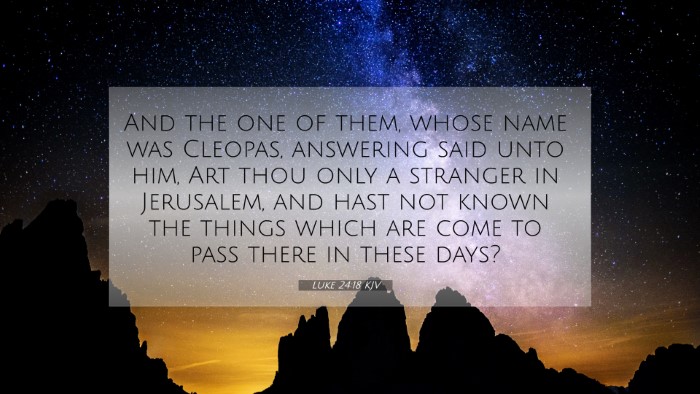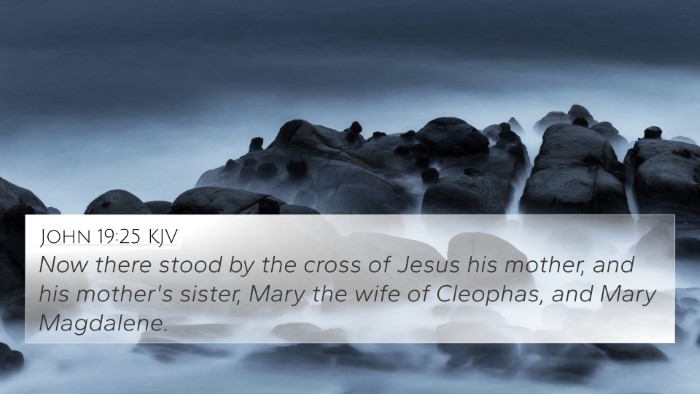Understanding Luke 24:18
The verse Luke 24:18 states, "And one of them, whose name was Cleopas, answering said unto him, Art thou only a stranger in Jerusalem, and hast not known the things which are come to pass there in these days?" This verse is part of the narrative following the resurrection of Jesus, where two disciples are on their way to Emmaus and encounter the risen Christ.
Verse Context and Significance
This moment encapsulates the confusion and disbelief of the disciples following the crucifixion of Jesus. Cleopas’s question indicates a lack of recognition of Jesus, emphasizing the theme of spiritual blindness present in the Gospels.
Insights from Commentaries
-
Matthew Henry: He emphasizes the disciples' despair and the irony that they were speaking with the very person they were discussing, yet did not recognize Him. Henry notes that this reflects the human condition of not perceiving divine truths amidst struggles.
-
Albert Barnes: Barnes highlights Cleopas’s surprise at the lack of knowledge of recent events, suggesting that it showcases how widespread the impact of Jesus's ministry and crucifixion had been. He comments on how this dialogue serves to illustrate the fulfillment of prophecy.
-
Adam Clarke: Clarke points out the social implications of Cleopas’s question, as it signifies the common understanding among Jews about the significance of Jesus. He indicates that the lack of awareness displayed by Jesus (who was, in fact, central to these events) serves as a challenge to the disciples to recognize Him fully.
Thematic Connections
This verse can be examined within several themes prevalent across the Bible:
- Recognition of Christ: The spiritual blindness that prevents people from recognizing Jesus is a recurring theme throughout the Gospels.
- Hope and Despair: The juxtaposition of hope in the resurrection and the despair following the crucifixion is critical in understanding Christian belief.
- Prophetic Fulfillment: Cleopas's ignorance points to how Jesus fulfilled the Old Testament prophecies, a key aspect of New Testament teachings.
Cross-References and Related Verses
To enrich the understanding of Luke 24:18, consider the following cross-references:
- John 20:14-16: Mary Magdalene encounters the risen Christ but does not recognize Him, mirroring Cleopas’s experience.
- Matthew 28:16-17: The Great Commission, where some disciples doubt upon encountering the risen Jesus.
- Mark 16:12-13: The account of Jesus appearing to the two disciples emphasizes their initial disbelief.
- Isaiah 53:3: A prophetic verse describing the suffering servant, paralleling the disciples' misunderstanding of Jesus's mission.
- Luke 18:31-34: Jesus predicts his death and resurrection, highlighting the fulfillment aspect that Cleopas references.
- Acts 1:3: Post-resurrection appearances of Jesus strengthen the connection between historical events and the risen Lord.
- 1 Corinthians 15:14: Highlights the importance of the resurrection; if false, the faith of believers is in vain, reflecting Cleopas’s despair.
- Jeremiah 29:14: A reminder of God's promise to gather His people, correlating with the resurrection narrative.
- Luke 24:25-27: Jesus Himself interprets the Scriptures to the disciples, clarifying their misunderstandings.
- Romans 10:9: Belief in the resurrection is essential for salvation, a theme central to the confusion faced by Cleopas.
Practical Applications
As we study Luke 24:18, we can consider its implications and applications in our lives:
- Awareness of Spiritual Truths: Reflect on areas in life where we may not recognize Jesus's presence or work.
- Encouragement in Doubt: Understand that confusion and doubt are part of our spiritual journey; seeking understanding through scripture is encouraged.
- Discussion of Faith: Engage in conversations about faith with others, just as Cleopas did, to deepen our understanding and resolve doubts.
Conclusion
Luke 24:18 serves as a poignant reminder of the struggles of understanding faith amid life's challenges. By connecting this verse with scriptures and examining its meaning through various commentaries, believers can find comfort and clarity in their spiritual journeys.
Keywords for Further Study
Consider exploring these themes using tools for Bible cross-referencing and resources for deeper study.
- How to find cross-references in the Bible
- Identifying connections between Old and New Testament
- Links between the Prophets and Apostolic teachings
- Comparative study of Pauline epistles
- Bible cross-references for sermon preparation



